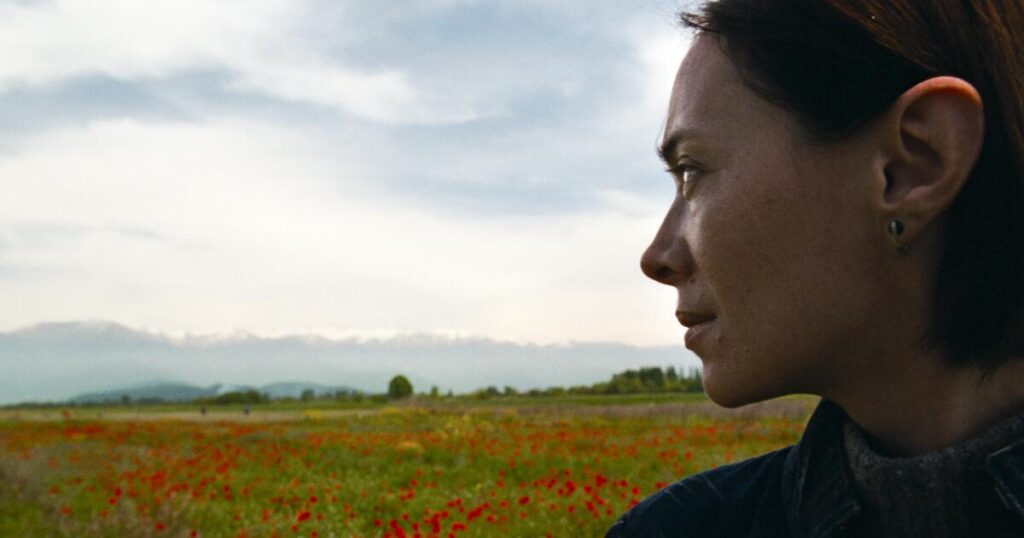In writer-director Déa Kulumbegashvili’s disquieting second feature, a strange creature is on the loose. We glimpse it in the first moments of “April” — this naked, human-like being whose body resembles a sagging skin bag. Possessing no eyes, no mouth and no face, with an almost alien lurching gait, that nightmarish figure will reappear every so often, its return always upsetting and unexplained. Remarkably, the creature is only slightly more unknowable than the film’s fascinatingly opaque main character.
To call “April” an abortion drama is accurate and yet that description only barely brushes against this movie’s blending and subversion of genres. Set in the country of Georgia, the movie (which won a Special Jury Prize at the Venice Film Festival) stars Ia Sukhitashvili as Nina, an expert obstetrician who, as the story begins, witnesses a tragedy. Kulumbegashvili plunges us into a delivery room as an expectant mother struggles to give birth, the filmmaker’s camera shielding us from nothing as the hospital staff desperately try to extract the child. Soon after the baby is declared dead, Nina is blamed by the woman’s husband and Nina’s unsmiling supervisor (Merab Ninidze) launches an investigation into what went wrong.
But Nina’s concern extends beyond the possibility of losing her job. It’s an open secret that Nina privately performs abortions for those in the impoverished outlying villages. Technically, abortion is legal for up to 12 weeks in Georgia, but in this conservative, patriarchal society, it’s nonetheless practically verboten. Any investigation into Nina could expose her clandestine activities and ruin her career — not to mention her ability to help more women, either to bring life into this world or terminate it.
Such a setup suggests the potential for a thriller, but Kulumbegashvili (who previously cast Sukhitashvili in her 2020 feature debut “Beginning”) is after something slipperier. And that starts with her conception of her protagonist, whose inner life she refuses to illuminate. Often shown on-screen in the middle distance or the background, her expressions always muted, Nina drifts through this slow-burn crisis without any palpable urgency or alarm. Emotionally, Sukhitashvili remains at arm’s length, her character’s actions inscrutable. One night, Nina drives into the countryside, picking up a random stranger and offering him a blowjob. Has she done this before? And if so, what’s provoking it? The answers are left as teasingly cryptic as the shocking outcome of that nocturnal interaction.
By stripping away genre conventions, “April” eschews traditional storytelling to zero in on far more existential matters — namely, the oppressive gloom descending on Nina. Filmed in a boxy aspect ratio that visually imprisons her in her circumstances, the movie uses tracking shots as hints into its character’s mindset. When the stoic Nina is off-screen during a scene, we occasionally hear her elevated breathing, proof of the silent stress choking her. This brilliant narrative stroke weaponizes even the film’s most tranquil interludes, creating the sense that we’re watching these moments through her eyes. Cinematographer Arseni Khachaturan’s images of sumptuous Georgian landscapes — vibrant red flowers dotting an impossibly lush field — are undercut by the anxiety within the person soaking in those sights.
Kulumbegashvili’s realist style — the writer-director filmed actual births — emphasizes antiseptic hospital hallways and the cold procedural quality of Nina’s work. (The process of delivering a baby is depicted as straightforwardly as performing an abortion.) Nina’s demeanor is equally stark. Preferring to be invisible, she goes about her business assisting pregnant women while sporadically conferring with David (Kakha Kintsurashvili), a sympathetic colleague heading the fateful investigation. Nina and David were once lovers, a fact he has never gotten over. Seated across from each other, David finally asks, “Why didn’t you marry me?” Tellingly, Nina is once again off camera when she slowly answers: “It would never have worked out. There’s no space for anyone in my life.”
We hear her, but we don’t see her. Indeed, Nina often seems just out of reach. “April” portrays her devotion to serving women in need as a noble but deadening calling, one that has caused her to withdraw into herself, perhaps as a coping mechanism to shut out the rage and helplessness she feels. With utter naturalism, Kulumbegashvili and her star dramatize a cruel, sexist reality that’s as unescapable as that inexplicable creature that repeatedly invades the story, its faceless presence a chilling, surreal metaphor for a society preying on Nina and her patients.
Not quite a thriller and not quite a horror movie, “April” is all the more haunting for never pinning down the roots of Nina’s retreat from life while dedicating herself to improving the lives of others. Near the film’s end, she’s scolded for her illegal activities, prompting Nina to offer a terse, weary reply: “If it’s not me, it’ll be someone else.” Once again she’s not on camera, but her voice of conscience reverberates.
‘April’
In Georgian, with subtitles
Not rated
Running time: 2 hours, 14 minutes
Playing: Laemmle Royal, West Los Angeles
